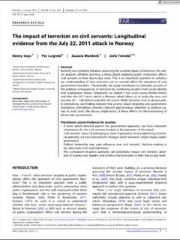Abstract
Building on a growing literature assessing the societal impact of terrorism, this article analyzes whether and how a terror attack targeting public institutions affects civil servants in their day-to-day work. This is an important question to enhance our understanding of how terrorism can (or cannot) affect the operation of core government functions. Theoretically, the study contributes to a broader account of the political consequences of terrorism by combining insights from social identity and organization theory. Empirically, we exploit a two-wave survey fielded before and after the 2011 terror attack in Norway, which allows us to study the same civil servants (N = 186) before and after this event. While terrorists wish to disrupt public institutions, our findings indicate that a terror attack targeting core government institutions strengthens internal cohesion and increases attention to political signals in work tasks. We discuss implications of these effects for the functioning of democratic government.
Full info
Benny Geys, Per Lægreid, Zuzana Murdoch and Jarle Trondal
The Impact of Terrorism on Civil Servants: Longitudinal Evidence from the 22 July 2011 Attack in Norway.
Public Administration Review, 2023, 83(6), pp. 1772-1784.
DOI0: https://doi.org/10.1111/puar.13694
